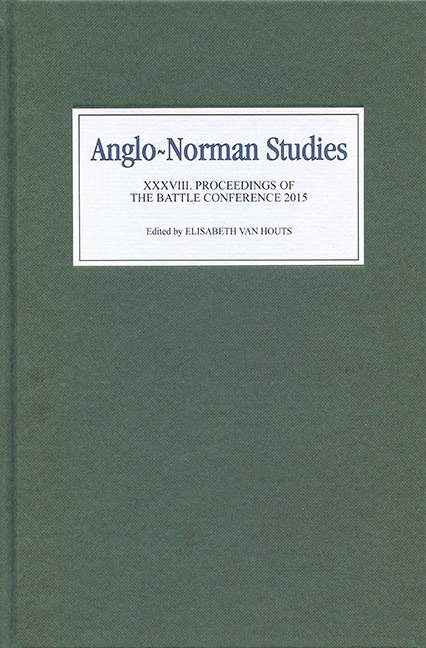Book contents
- Frontmatter
- Contents
- Illustrations and Tables
- Editor's Preface
- Abbreviations
- From the Articles of the Barons to Magna Carta (The R. Allen Brown Memorial Lecture, 2015)
- Jews in the Glosses of a Late Twelfth-Century Anglo-Norman Gratian Manuscript (Cambridge, Gonville and Caius College, MS 283/676)
- Monastic Autonomy, Episcopal Authority and the Norman Conquest: The Records of Barking Abbey (The Marjorie Chibnall Memorial Essay, 2015)
- Economy Distorted, Economy Restored: Order, Economy and Salvation in Anglo-Norman Monastic Writing
- Monastic Patronage and Family Disputes in Eleventh- and Early Twelfth-Century Normandy
- Constance, Princess of Antioch (1130–1164): Ancestry, Marriages and Family
- Early Aristocratic Seals: An Anglo-Norman Success Story
- English Towns and Urban Society after the Norman Conquest
- Wreck of the Sea in Law and Practice in Eleventh- and Twelfth-Century England
- Social Life and Religious Culture in Twelfth-Century Norwich and Norfolk
- Bad Crusaders? The Normans of Southern Italy and the Crusading Movement in the Twelfth Century
- Turold, Wadard and Vitalis: Why Are They on the Bayeux Tapestry?
Monastic Autonomy, Episcopal Authority and the Norman Conquest: The Records of Barking Abbey (The Marjorie Chibnall Memorial Essay, 2015)
Published online by Cambridge University Press: 12 September 2017
- Frontmatter
- Contents
- Illustrations and Tables
- Editor's Preface
- Abbreviations
- From the Articles of the Barons to Magna Carta (The R. Allen Brown Memorial Lecture, 2015)
- Jews in the Glosses of a Late Twelfth-Century Anglo-Norman Gratian Manuscript (Cambridge, Gonville and Caius College, MS 283/676)
- Monastic Autonomy, Episcopal Authority and the Norman Conquest: The Records of Barking Abbey (The Marjorie Chibnall Memorial Essay, 2015)
- Economy Distorted, Economy Restored: Order, Economy and Salvation in Anglo-Norman Monastic Writing
- Monastic Patronage and Family Disputes in Eleventh- and Early Twelfth-Century Normandy
- Constance, Princess of Antioch (1130–1164): Ancestry, Marriages and Family
- Early Aristocratic Seals: An Anglo-Norman Success Story
- English Towns and Urban Society after the Norman Conquest
- Wreck of the Sea in Law and Practice in Eleventh- and Twelfth-Century England
- Social Life and Religious Culture in Twelfth-Century Norwich and Norfolk
- Bad Crusaders? The Normans of Southern Italy and the Crusading Movement in the Twelfth Century
- Turold, Wadard and Vitalis: Why Are They on the Bayeux Tapestry?
Summary
The body of sources associated with the nunnery of Barking lends a new perspective to an enduring theme of eleventh-century history: the response of Anglo-Saxon monastic foundations to the new world created by the Norman Conquest. To meet the danger of undue interference by the new clerical and secular elite, monastic houses turned to their often distant pasts, and especially to their venerable saints’ cults, to assert their autonomy. Historians have generally seen this as turning a problem into an opportunity: that this use of the past was anachronistic, because it sought to vindicate distinctly late eleventh-century freedoms. But as Julia Crick has observed, ‘the draftsmen and historians responsible for the wholesale adaptation of the written record after the Norman Conquest did not conjure the rhetoric of monastic liberty out of thin air’. As we shall see, at Barking as elsewhere, the substantial archive on which post-Conquest claims to freedom drew included not only hagiographical material but also the institutional memory of previous struggles over the community's jurisdiction and patronage.
The central focus of the programme of reorganization at late eleventh-century Barking was nonetheless the promotion of its saints’ cults. This involved construction of a new church and new tombs for saints, the translation of saints’ relics, and the production of a series of hagiographical texts, now collectively known as the Barking cycle. The cycle, produced at some point between 1086 and 1100, forms part of a significant upsurge in the production of saints’ lives, translation accounts and miracle collections in England which followed the Norman Conquest. As such, it appears to belong to a context of reorganization stimulated by the Norman takeover of English secular and ecclesiastical organization.
The traditional view, that post-Conquest promotion of Anglo-Saxon saints’ cults represented the reaction of English communities to the scepticism of Norman churchmen toward English saints, has been challenged by Susan Ridyard, who highlighted the promotion of English saints by the Normans themselves. The widespread displacement of leadership within the Church after the Conquest meant that in fact a great number of English saints’ cults cultivated after 1066 were fostered by Norman churchmen who, as Lapidge and Love point out, would have found it ‘prudent and politic’ to accept and utilize the patron saints of their houses.
- Type
- Chapter
- Information
- Anglo-Norman Studies XXXVIIIProceedings of the Battle Conference 2015, pp. 35 - 50Publisher: Boydell & BrewerPrint publication year: 2016



